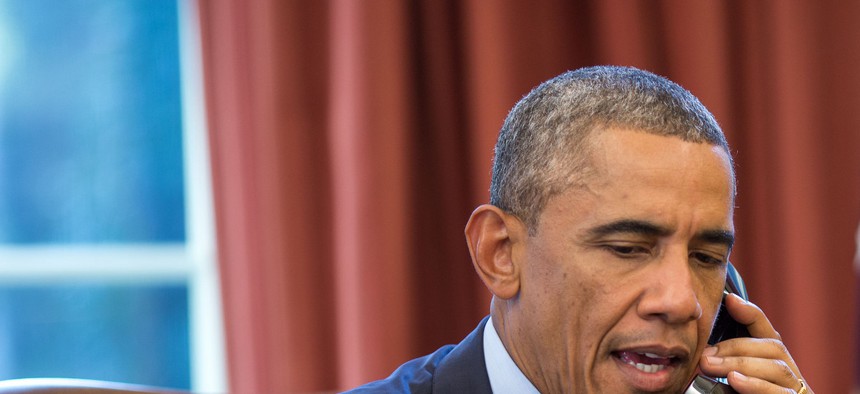
Pete Souza/White House
Obama's War Authority Request Is Stuck
A month after the White House released a draft AUMF, the measure isn't gaining support in either chamber or party.
The White House's proposal for authorization to fight the Islamic State landed on Capitol Hill in mid-February with a thud—and little apparent chance for passage. One month later, its prospects look even worse.
The problem: The Obama administration believes it already has the authority it needs to carry out its mission, and absent any sense of urgency in Washington, there's scant political pressure to build a coalition for a tough war vote. On the Senate side, Foreign Relations Committee Chairman Bob Corker has warned that the administration's proposal is already in trouble, with little buy-in from Democrats. And while liberals are leery of any vote that would put them on the record for another war, conservative hawks have criticized the AUMF for being overly restrictive.
The outlook isn't much better in the House. "The president's saying he's already got the authority, and they're already taking action," said a Democratic staffer on the House Armed Services Committee. "The things that would normally force people to come to 218 just aren't there."
The White House is currently relying on the 2001 Authorization for the Use of Military Force, one drafted after the Sept. 11 terrorist attacks, and only came to Congress with a new authorization request after months of pressure from Capitol Hill. For some in Congress, the proposal doesn't represent a serious effort to earn lawmakers' backing.
"It's probably a show of 'here's something from the White House,'" said an aide to an antiwar progressive House member. "It is an attempt to ease some of those concerns [about not having an updated AUMF], then blame the other side of the aisle for not bringing something forward. If this goes to hell in a handbasket—'Well, Congress never got on board with this.' "
On both sides of the aisle, there's concern that the new proposal is more an attempt to appease anxious lawmakers than to put the country's war-fighting ability on a new footing. "The White House didn't really do a thorough job up here on the Hill," said a senior GOP aide. "When they rolled it out, they came up the night before. … It wasn't [Chief of Staff Denis] McDonough, it wasn't any of those guys. That is just kind of telling in itself." (White House counsel Neil Eggleston briefed members on the plan).
Even among Democrats, there's skepticism that the plan can gather momentum. "There hasn't been much outreach, if any," said the Armed Services aide. "'You guys said give us language, we gave you language. Over to you.' … Most Democrats say those restrictions aren't harsh enough, and most Republicans say they're way too harsh. There's no real overlap except for 'no.'"
Still, a Democratic staffer on the House Foreign Affairs Committee cautioned that it's too soon to determine the plan's prospects of passage. "They've been engaged with us, but I think that they're giving members that time to figure things out," he said. "I don't think they're in the whipping-votes stage of this."
Both sides, though, have already expressed deep concerns about the White House proposal. Many Republicans see the proposed restrictions—ground-troops limitations and a three-year cutoff date—as limiting the military's ability to wage war effectively. "The White House is essentially asking for Congress to tie its hands in trying to fight ISIL," said the GOP aide. "There is a majority in the House that, if a plan is presented to Congress that achieves the goal, there probably is support to get behind that. But right now, that doesn't appear to be the case."
And even if that consensus is achieved on the House side, few are convinced the AUMF in its current state can pass the Senate. "I wouldn't expect the House to move unless they had something from the Senate," said the progressive aide. "To me, this looks a little DOA. … The White House did what it needed to do by sending this up here, but neither side really wants to take this on."






